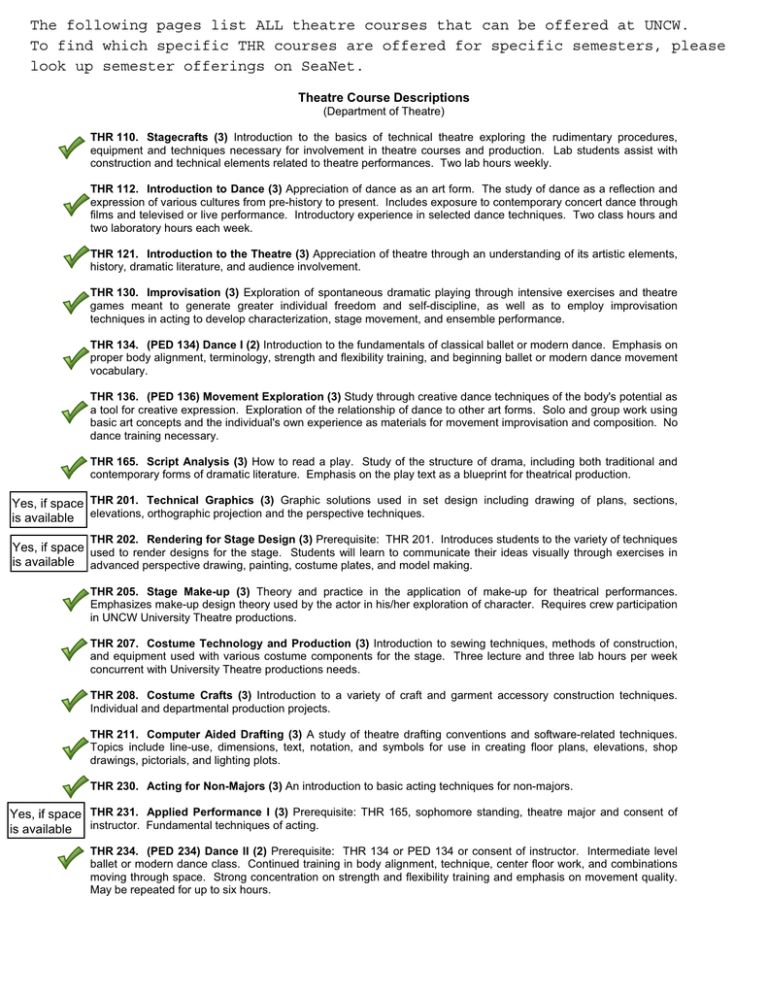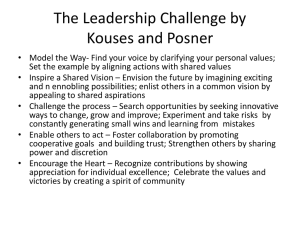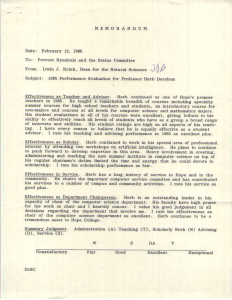The following pages list ALL theatre courses that can be... To find which specific THR courses are offered for specific...
advertisement

The following pages list ALL theatre courses that can be offered at UNCW. To find which specific THR courses are offered for specific semesters, please look up semester offerings on SeaNet. Theatre Course Descriptions (Department of Theatre) THR 110. Stagecrafts (3) Introduction to the basics of technical theatre exploring the rudimentary procedures, equipment and techniques necessary for involvement in theatre courses and production. Lab students assist with construction and technical elements related to theatre performances. Two lab hours weekly. THR 112. Introduction to Dance (3) Appreciation of dance as an art form. The study of dance as a reflection and expression of various cultures from pre-history to present. Includes exposure to contemporary concert dance through films and televised or live performance. Introductory experience in selected dance techniques. Two class hours and two laboratory hours each week. THR 121. Introduction to the Theatre (3) Appreciation of theatre through an understanding of its artistic elements, history, dramatic literature, and audience involvement. THR 130. Improvisation (3) Exploration of spontaneous dramatic playing through intensive exercises and theatre games meant to generate greater individual freedom and self-discipline, as well as to employ improvisation techniques in acting to develop characterization, stage movement, and ensemble performance. THR 134. (PED 134) Dance I (2) Introduction to the fundamentals of classical ballet or modern dance. Emphasis on proper body alignment, terminology, strength and flexibility training, and beginning ballet or modern dance movement vocabulary. THR 136. (PED 136) Movement Exploration (3) Study through creative dance techniques of the body's potential as a tool for creative expression. Exploration of the relationship of dance to other art forms. Solo and group work using basic art concepts and the individual's own experience as materials for movement improvisation and composition. No dance training necessary. THR 165. Script Analysis (3) How to read a play. Study of the structure of drama, including both traditional and contemporary forms of dramatic literature. Emphasis on the play text as a blueprint for theatrical production. Yes, if space THR 201. Technical Graphics (3) Graphic solutions used in set design including drawing of plans, sections, is available elevations, orthographic projection and the perspective techniques. THR 202. Rendering for Stage Design (3) Prerequisite: THR 201. Introduces students to the variety of techniques Yes, if space used to render designs for the stage. Students will learn to communicate their ideas visually through exercises in is available advanced perspective drawing, painting, costume plates, and model making. THR 205. Stage Make-up (3) Theory and practice in the application of make-up for theatrical performances. Emphasizes make-up design theory used by the actor in his/her exploration of character. Requires crew participation in UNCW University Theatre productions. THR 207. Costume Technology and Production (3) Introduction to sewing techniques, methods of construction, and equipment used with various costume components for the stage. Three lecture and three lab hours per week concurrent with University Theatre productions needs. THR 208. Costume Crafts (3) Introduction to a variety of craft and garment accessory construction techniques. Individual and departmental production projects. THR 211. Computer Aided Drafting (3) A study of theatre drafting conventions and software-related techniques. Topics include line-use, dimensions, text, notation, and symbols for use in creating floor plans, elevations, shop drawings, pictorials, and lighting plots. THR 230. Acting for Non-Majors (3) An introduction to basic acting techniques for non-majors. Yes, if space THR 231. Applied Performance I (3) Prerequisite: THR 165, sophomore standing, theatre major and consent of is available instructor. Fundamental techniques of acting. THR 234. (PED 234) Dance II (2) Prerequisite: THR 134 or PED 134 or consent of instructor. Intermediate level ballet or modern dance class. Continued training in body alignment, technique, center floor work, and combinations moving through space. Strong concentration on strength and flexibility training and emphasis on movement quality. May be repeated for up to six hours. THR 241. Painting and Properties Studio (1) Prerequisite: THR 110. Structured involvement in theatre production preparation and running in the areas of scenic painting, properties and set dressing. One lecture and three laboratory hours per week. Requires crew participation in UNCW University Theatre productions. THR 242. Technical Production Studio (1) Prerequisite: THR 110. Structured involvement in theatre production Yes, if space preparation and implementation in the areas of scenic construction, lighting and sound installation. One lecture and is available three laboratory hours per week. Requires crew participation in UNCW University Theatre productions. THR 243. Costume and Makeup Studio (1) Prerequisite: THR 110. Structured involvement in theatre production preparation and implementation in the areas of costume construction and makeup application. One lecture and three laboratory hours per week. Requires crew participation in UNCW University Theatre productions. If student THR 250. Applied Performance Lab (2) Prerequisite: Consent of instructor. University Theatre sponsored auditions for laboratory for applied performance. Students must undergo a competitive audition held by a UNCW director, and and earns a successful casting, rehearsal, performance and associated duties of a University Theatre production. May be role in a UNCWrepeated once. performance THR 295. Topics in Theatre (3) Prerequisite: THR 165 or consent of instructor. A broad study of a topic within the theatre discipline, such as history of theatrical design, dramatic theory, Commedia dell Arte. Content will be geared to the student with a general understanding of theatre. May be repeated under a different subtitle. THR 301. Voice and Movement I (3) Prerequisite: Theatre majors only. Exploration of the body and voice as the primary tools of the actor’s instrument. Identification of habitual practices such as physical tensions and regional vocal patterns will be addressed. Codified methodologies of vocal training for the actor and elements of the International Phonetic Alphabet will be introduced. THR 302. Voice and Movement II (3) Prerequisite: Theatre major and THR 301. The student is expected to eradicate personal idiosyncratic movement habits and regional vocal patterns identified in THR 301. A continued study and competency of the International Phonetic Alphabet and voice and movement training is expected. Both are dependent on space and instructor THR 305. Scenic Design (3) Prerequisite: THR 165 or consent of instructor. An intermediate study of set design development and presentation. Topics include script interpretation; research methods; sketching and rendering; perspective techniques; drafting floor plans, elevations, and centerline sections; and model making. THR 306. Lighting Design (3) Prerequisite: THR 165 or consent of instructor. Basic techniques of lighting design. Includes fundamentals of lighting production techniques and equipment, and the use of color. Requires participation in University Theatre productions. THR 308. Costume Design (3) Prerequisite: THR 165 or consent of instructor. Principles of theatrical design applied to stage costume. Period play interpretation, figure drawing, color theory, and rendering techniques pursuant to developing an individual aesthetic and design style. THR 309. Costume History (3) Historical costume styles from Greek and Roman to modern day through lecture, discussion, projects and papers. Yes, if pre-req THR 310. Sound Design (3) Prerequisite: THR 165. Basic techniques of sound design. Includes fundamentals of met and space the use of stage sound reinforcement and computerized sound production. is available THR 312. Scene Painting (3) Beginning exercises with materials and tools used to paint stage settings and Yes, if space backdrops. Demonstrations and projects in brush and non-brush techniques; layout; color mixing; and stencils. is available Practical projects include color blends; textures; brick and stone; interior and exterior woodwork, and marble. Requires involvement with University Theatre productions. THR 316. (CRW 316) Playwriting I (3) Prerequisite: ENG 201. Analysis of one-act plays and their construction; the writing of an original one-act play required. Yes, if space THR 321. Western Theatre History I (3) Prerequisite: THR 165 or consent instructor. Classical Greece through the Renaissance. Emphasis on theatrical production in its cultural contexts, including playwriting, acting, staging, is available architecture, and audiences. THR 322. Western Theatre History II (3) Prerequisite: THR 165 or consent instructor. Development of theatre and Yes, if space drama from the seventeenth century to World War II. Emphasis on theatrical production in its cultural contexts, is available including playwriting, acting, staging, architecture, and audiences. THR 332. Applied Performance II (3) Prerequisite: THR 231 or consent of instructor. Continuation of Applied Performance I with increased emphasis on individual growth, creative development, and scene study and performance. Four contact hours per week. THR 333. Applied Performance III (3) Prerequisite: THR 332 or consent of instructor. Preparation for performance and individual character study for the advanced student of acting. Yes, if space THR 335. (FST 335) Acting for the Camera (3) Prerequisites: THR 231 or THR 332 or consent of instructor. is available Explores acting techniques particular to the mediums of film and video. THR 355. Directing I (3) Prerequisite: THR 305, 306, 308 or consent of instructor. Fundamental principles of directing with emphasis on one-act productions. THR 365. (ENG 365) Studies in Drama (3) Prerequisite: ENG 103 or 201 recommended but not required. A variety of plays representing tragedy, comedy, and modern forms. Works from a variety of periods, authors, and traditions with some attention to dramatic criticism. May be repeated once under a different subtitle. THR 395. Advanced Studies in Theatre (3) Prerequisite: THR 165 or consent of instructor. In-depth study of a specific topic within the theatre discipline, such as advanced scene painting techniques, dramatic theory of a particular era, or advanced theatrical lighting. May be repeated once under a different subtitle. THR 401. Advanced Movement (3) Prerequisite: Consent of instructor. Advanced movement techniques and skills for actors including armed and unarmed combat, basic stuntwork, circus skills and viewpoints. Period-style courtesies such as Commedia dell’Arte appropriate for the stage or camera. THR 402. Advanced Voice (3) Prerequisites: THR 301, 302 and consent of instructor. Advanced technical vocal skills for actors including dialects for the stage expressed in the world canon of literature and performance. Advanced application of the International Phonetic Alphabet and vocal production will be explored. May not be offered THR 411. Three Dimensional Computer Modeling (3) Prerequisite: THR 211. A study of software to develop models of scene designs for the stage. Topics include shape and texture generation; light handling; rendering; scanning; and output. THR 433. Applied Performance IV (3) Prerequisites: THR 231, 232, 301, 302, and 333 and consent of instructor. Explores acting styles in various historical periods of the theatre, such as Greek, Commedia dell’Arte, Shakespearean and Neo-classical. THR 445. (CRW 445) Playwriting II (3) Prerequisite: THR 316 (ENG 316) or consent of instructor. Advanced techniques of playwriting with an emphasis on full-length plays; the writing of an original full-length play. THR 455. Directing II (3) Prerequisite: THR 355. Advanced techniques in the direction of plays for the stage. THR 485. Senior Project (3) Every major may choose an area in theatre for a senior project. The proposal for planning and executing a public presentation in the chosen area must be submitted to the Department of Theatre faculty for approval prior to the semester during which the project will be attempted. THR 486. Senior Seminar: Performance (3) Prerequisite: Senior standing in theatre. A comprehensive Not appropriate assessment of the performance student’s experience and study as a theatre major in preparation for continued study for exchange or employment. Preparation of portfolio and scenes. THR 487. Senior Seminar: Design and Technology (3) Prerequisite: Senior standing in theatre. A comprehensive assessment and synthesis of the design/tech student’s four-year experience as a theatre major in preparation for employment or continued study. Development of resumé and career goals strategy, organization and formatting of portfolio materials, presentation exercises, and a study of interview and workplace issues. THR 491. Directed Individual Study (1-3) Prerequisite: Overall GPA of at least 2.00, junior or senior standing, and consent of instructor, department chair and dean. Involves investigation under faculty supervision beyond what is offered in existing courses. For further information, consult the Directed Individual Studies section in this catalogue. THR 495. Theatre Seminars (1-3) Consideration of special subjects not covered in regular course offerings. More than one topic may be taken for credit. THR 498. Internship in Theatre (3 or 6) Prerequisite: Junior or senior standing, minimum 3.00 GPA in the major, and consent of chair. Academic training and practical field experience through a program of work and study within an agency and/or setting related to the student's principal area of interest. Faculty supervision and evaluation of all study and on-site activity. (A maximum of six credit hours may be applied toward the degree). THR 499. Honors Work in Theatre (2-3) Prerequisite: Senior standing. Independent study for honors students. Not appropriate for exchange For 292 and 492; 294 and 494 see explanation on p. 187, 109.


